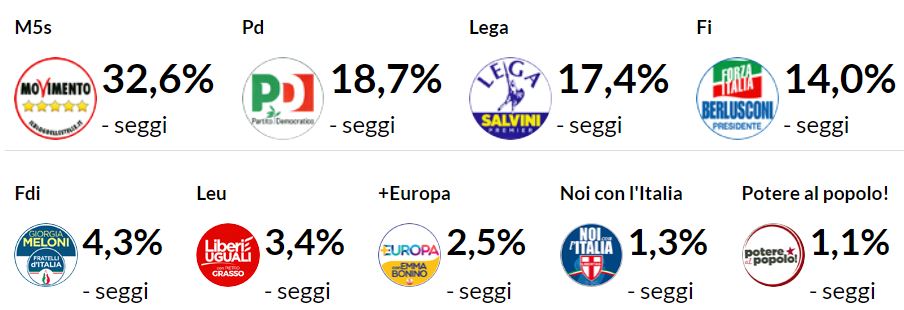
The first datum I find interesting about the outcome is that despite the voting procedure was constrained to last a single day (it usually lasted 1.5), a total of three quarters of citizens cast a vote, a number that is not substantially lower than previous ones, and remains overall higher than in many advanced countries. Despite this datum, which suggests an apparent faith in the system, Italians showed with their vote that they do not trust the political elite any longer, as Beppe Grillo's relatively new "anti-political" movement, the "Movimento cinquestelle" (M5S) conquered the first position and collected just below a third of the votes. More established parties - the democratic party and Berlusconi's "Forza Italia" - suffered significant losses, with the exception of "Lega nord", the anti-immigration, pro-division party which saw a considerable increase.
It would be fallacious, however, to conclude that Italy is a country characterized by a strong dynamism in the flux of electorate from one party to the other. While the M5S is a "new" movement, having been around for less than a decade, it draws in good part from electors who would otherwise not vote for any party: it is a "non-party" which does not exhibit any real program or defined ideology at its roots. If we removed those votes, the rest would distribute to left, center and right parties more or less similarly to what they have been doing ever since the end of the second world war.
What is really new in Italy is the increasing impact of the latent political theme of immigration. Italy seems to me to be following more or less the same trajectory of France, a country which has a much larger fraction of immigrants and which has already had to face the related problems -integration, job policies, countering racist extremisms. This is a factor that appears to be tilting a bit toward the right the balance of the political spectrum in Italy at the moment.
The big question, following yesterday's elections, is whether the M5S will manage to form a coalition with another party, and propose a government with enough delegates to be able to approve laws and properly function. One possibility is an alliance with the democratic party: while this has been negated as an option by the democrats, it remains potentially on the table. The other is an alliance with Lega Nord, which would probably be more coherent with some of the pre-election attitude of the involved parties.
The bottomline is that Italy is at a difficult juncture, with the possibility of a lack of a proper government for several months to come, and with a latent crisis of the political system, incapable of offering a credible plan and trustable leaders. Wish us luck.
----
Tommaso Dorigo is an experimental particle physicist who works for the INFN at the University of Padova, and collaborates with the CMS experiment at the CERN LHC. He coordinates the European network AMVA4NewPhysics as well as research in accelerator-based physics for INFN-Padova, and is an editor of the journal Reviews in Physics. In 2016 Dorigo published the book “Anomaly! Collider physics and the quest for new phenomena at Fermilab”. You can get a copy of the book on Amazon.






Comments